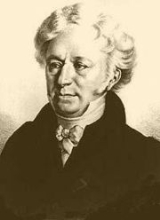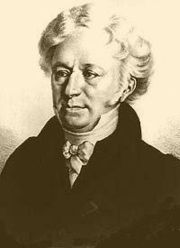
Louis Pierre Edouard, Baron Bignon
Encyclopedia
Louis Pierre Edouard, Baron Bignon (3 January 1771 – 1841) was a French diplomat and historian.
 Louis de Bignon was born at Rouen
Louis de Bignon was born at Rouen
, Seine-Maritime
, the son of a dyer. Although he had received a good education, he served throughout the early part of the French Revolutionary Wars
without rising above the rank of private. In 1797, however, the attention of Talleyrand, then minister of foreign affairs, was called to his exceptional abilities by General Huet, and he was attached to the diplomatic service.
After serving in the legations in Switzerland and the Cisalpine Republic
, he was appointed in 1799 attach to the French legation at Berlin, of which three years later he became chargé d'affaires
. As minister-plenipotentiary at Cassel
, between the years 1804 and 1806, he took a prominent share in the formation of the confederation of the Rhine
; and after the battle of Jena he returned to Prussia
as administrator of the public domains and finances. He filled a similar function in Austria after the battle of Wagram
. At the end of 1810 he became French resident at Warsaw
and was for a couple of years supreme in the affairs of the grand duchy
.
The preparation of a constitution for Poland, on which he was engaged, was, however, interrupted by the events of 1812. Bignon, after a short imprisonment at the hands of the allies, returned to France in time to witness the downfall of Napoleon
. During the Hundred Days
he once more entered Napoleon's service, and, after the battle of Waterloo
, as minister of foreign affairs under the executive commission, it was he who signed the convention of the 3rd of July 1815, by which Paris was handed over to the allies.
Bignon did not re-enter public life until 1817, when he was elected to the chamber of deputies, in which he sat until 1830, consistent in his opposition to the reactionary policy of successive governments. His great reputation and his diplomatic experience gave a special weight to the attacks which he published on the policy of the continental allies, two of his works attracting special attention, Du Congrs de Troppau ou Examen des prtentions des monarchies absolues a lgard de la monarchic constitutionelle de Naples (Paris, 1821), and Les Cabinets et les peuples depuis 1815 jusqud la fin de 1822 (Paris, 1822).
The July Revolution
, which brought his party into power, only led to a very temporary resumption of office by Bignon. He was for a few weeks minister of foreign affairs in the first government of Louis Philippe
, and again for a few weeks minister of public instruction. But the idea of making him responsible for the foreign policy of France could not be realized owing to the necessity under which Louis Philippe lay of courting the goodwill of the powers, whom Bignon had offended by his outspoken writings.
Elected deputy in 1831 and member of the chamber of peers in 1839, he withdrew for the most part from politics to devote himself to his great work, the Histoire de France sous Napoleon (10 vols. 1829-1838, then 4 posthumous vols., 1847-1850). This history, while suffering the limitations of all contemporaneous narratives, contains much that does not exist elsewhere, and is one of the best-known sources for the later histories of Napoleon's reign.
Biography

Rouen
Rouen , in northern France on the River Seine, is the capital of the Haute-Normandie region and the historic capital city of Normandy. Once one of the largest and most prosperous cities of medieval Europe , it was the seat of the Exchequer of Normandy in the Middle Ages...
, Seine-Maritime
Seine-Maritime
Seine-Maritime is a French department in the Haute-Normandie region in northern France. It is situated on the northern coast of France, at the mouth of the Seine, and includes the cities of Rouen and Le Havre...
, the son of a dyer. Although he had received a good education, he served throughout the early part of the French Revolutionary Wars
French Revolutionary Wars
The French Revolutionary Wars were a series of major conflicts, from 1792 until 1802, fought between the French Revolutionary government and several European states...
without rising above the rank of private. In 1797, however, the attention of Talleyrand, then minister of foreign affairs, was called to his exceptional abilities by General Huet, and he was attached to the diplomatic service.
After serving in the legations in Switzerland and the Cisalpine Republic
Cisalpine Republic
The Cisalpine Republic was a French client republic in Northern Italy that lasted from 1797 to 1802.-Birth:After the Battle of Lodi in May 1796, Napoleon Bonaparte proceeded to organize two states: one to the south of the Po River, the Cispadane Republic, and one to the north, the Transpadane...
, he was appointed in 1799 attach to the French legation at Berlin, of which three years later he became chargé d'affaires
Chargé d'affaires
In diplomacy, chargé d’affaires , often shortened to simply chargé, is the title of two classes of diplomatic agents who head a diplomatic mission, either on a temporary basis or when no more senior diplomat has been accredited.-Chargés d’affaires:Chargés d’affaires , who were...
. As minister-plenipotentiary at Cassel
Kassel
Kassel is a town located on the Fulda River in northern Hesse, Germany. It is the administrative seat of the Kassel Regierungsbezirk and the Kreis of the same name and has approximately 195,000 inhabitants.- History :...
, between the years 1804 and 1806, he took a prominent share in the formation of the confederation of the Rhine
Confederation of the Rhine
The Confederation of the Rhine was a confederation of client states of the First French Empire. It was formed initially from 16 German states by Napoleon after he defeated Austria's Francis II and Russia's Alexander I in the Battle of Austerlitz. The Treaty of Pressburg, in effect, led to the...
; and after the battle of Jena he returned to Prussia
Prussia
Prussia was a German kingdom and historic state originating out of the Duchy of Prussia and the Margraviate of Brandenburg. For centuries, the House of Hohenzollern ruled Prussia, successfully expanding its size by way of an unusually well-organized and effective army. Prussia shaped the history...
as administrator of the public domains and finances. He filled a similar function in Austria after the battle of Wagram
Battle of Wagram
The Battle of Wagram was the decisive military engagement of the War of the Fifth Coalition. It took place on the Marchfeld plain, on the north bank of the Danube. An important site of the battle was the village of Deutsch-Wagram, 10 kilometres northeast of Vienna, which would give its name to the...
. At the end of 1810 he became French resident at Warsaw
Warsaw
Warsaw is the capital and largest city of Poland. It is located on the Vistula River, roughly from the Baltic Sea and from the Carpathian Mountains. Its population in 2010 was estimated at 1,716,855 residents with a greater metropolitan area of 2,631,902 residents, making Warsaw the 10th most...
and was for a couple of years supreme in the affairs of the grand duchy
Grand duchy
A grand duchy, sometimes referred to as a grand dukedom, is a territory whose head of state is a monarch, either a grand duke or grand duchess.Today Luxembourg is the only remaining grand duchy...
.
The preparation of a constitution for Poland, on which he was engaged, was, however, interrupted by the events of 1812. Bignon, after a short imprisonment at the hands of the allies, returned to France in time to witness the downfall of Napoleon
Napoleon I of France
Napoleon Bonaparte was a French military and political leader during the latter stages of the French Revolution.As Napoleon I, he was Emperor of the French from 1804 to 1815...
. During the Hundred Days
Hundred Days
The Hundred Days, sometimes known as the Hundred Days of Napoleon or Napoleon's Hundred Days for specificity, marked the period between Emperor Napoleon I of France's return from exile on Elba to Paris on 20 March 1815 and the second restoration of King Louis XVIII on 8 July 1815...
he once more entered Napoleon's service, and, after the battle of Waterloo
Battle of Waterloo
The Battle of Waterloo was fought on Sunday 18 June 1815 near Waterloo in present-day Belgium, then part of the United Kingdom of the Netherlands...
, as minister of foreign affairs under the executive commission, it was he who signed the convention of the 3rd of July 1815, by which Paris was handed over to the allies.
Bignon did not re-enter public life until 1817, when he was elected to the chamber of deputies, in which he sat until 1830, consistent in his opposition to the reactionary policy of successive governments. His great reputation and his diplomatic experience gave a special weight to the attacks which he published on the policy of the continental allies, two of his works attracting special attention, Du Congrs de Troppau ou Examen des prtentions des monarchies absolues a lgard de la monarchic constitutionelle de Naples (Paris, 1821), and Les Cabinets et les peuples depuis 1815 jusqud la fin de 1822 (Paris, 1822).
The July Revolution
July Revolution
The French Revolution of 1830, also known as the July Revolution or in French, saw the overthrow of King Charles X of France, the French Bourbon monarch, and the ascent of his cousin Louis-Philippe, Duke of Orléans, who himself, after 18 precarious years on the throne, would in turn be overthrown...
, which brought his party into power, only led to a very temporary resumption of office by Bignon. He was for a few weeks minister of foreign affairs in the first government of Louis Philippe
Louis-Philippe of France
Louis Philippe I was King of the French from 1830 to 1848 in what was known as the July Monarchy. His father was a duke who supported the French Revolution but was nevertheless guillotined. Louis Philippe fled France as a young man and spent 21 years in exile, including considerable time in the...
, and again for a few weeks minister of public instruction. But the idea of making him responsible for the foreign policy of France could not be realized owing to the necessity under which Louis Philippe lay of courting the goodwill of the powers, whom Bignon had offended by his outspoken writings.
Elected deputy in 1831 and member of the chamber of peers in 1839, he withdrew for the most part from politics to devote himself to his great work, the Histoire de France sous Napoleon (10 vols. 1829-1838, then 4 posthumous vols., 1847-1850). This history, while suffering the limitations of all contemporaneous narratives, contains much that does not exist elsewhere, and is one of the best-known sources for the later histories of Napoleon's reign.

